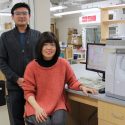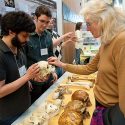Campus push to address crisis in U.S. biomedical research

Studying the process by which RNA is made from DNA, a doctoral student works with radioactive tracers in a lab at the Biochemical Sciences Building in April 2012.
The growing realization that the American biomedical research enterprise is unsustainable and requires a comprehensive fix will be the subject of a wide-ranging campus conversation to take place over the next few months.
In an April 2014 article in the Proceedings of the National Academy of Sciences (PNAS), several of the nation’s leading biomedical scientists documented “an unsustainable, hypercompetitive system” that discourages the best prospective students and hamstrings even the most accomplished biomedical scientists, keeping them from doing their best work.
The article — authored by Bruce Alberts of the University of California, San Francisco; Marc Kirschner of Harvard University; Shirley Tilghman of Princeton University; and Harold Varmus of the National Cancer Institute — lays out in stark terms a set of unprecedented challenges undermining the ability of biomedical researchers and the institutions where they work to successfully fulfill their missions.
The problems, familiar to anyone in the biomedical research environment, include:
- Hypercompetition and its damaging effects.
- Crippling demands on scientists’ time.
- Supporting the next generation of scientists.
- “Perverse incentives” in how research is funded.
“The system is broken. That’s the bottom line,” says Judith Kimble, a Howard Hughes Medical Institute investigator and UW–Madison professor of biochemistry. “This is an issue the entire biomedical community is going to be facing.”
The authors of the PNAS report acknowledge that biomedical science is in a “golden age.” Building on the discovery of such things as the genetic code, the principles that govern cell behavior, the identification of molecules that direct cell signaling, and the sequencing and organization of the genomes of numerous organisms, including humans, many diseases can now be prevented, controlled or cured.
However, a central assumption by many scientists and research organizations — that the biomedical research enterprise will forever grow — is fundamentally flawed, and the community has over the past decade, in fact, experienced the limits of growth. The upshot, write Alberts, Kirschner, Tilghman and Varmus, is a “hypercompetitive atmosphere” for finite resources, growing pessimism among researchers, reduced scientific productivity and the short-circuiting of promising careers as the best students turn away from biomedical science.
“These are experiences and perceptions that are becoming increasingly common in our world,” explains Interim Vice Chancellor for Research and Graduate Education Marsha Mailick. “The bigger problem is something we will need to address as UW–Madison is a premier biomedical research university. We will have to come to grips with the issue for the sake of our faculty and students, and for the greater good of American biomedical science.”
Toward that aspiration, the university will conduct a series of campuswide discussions with a Feb. 16 launch by Chancellor Rebecca Blank. At the Feb. 16 rollout, the problem will be summarized and illustrated with relevant data, and workshop goals will be framed.
See sidebar: “Sessions set to discuss biomedical research crisis”
In March, a subsequent series of meetings will be held for members of the UW–Madison biomedical research community to discuss such things as the size of the biomedical research workforce, changes to the biomedical research workplace, National Institutes of Health (NIH) grant mechanisms and NIH evaluation mechanisms. Those conversations will culminate in an April 11 workshop aimed at identifying strategies and tactics to address the issue, and that will be included in a report to be presented at a national conference on the topic in May at the University of Michigan.
“If you look at the data, something drastic needs to be done,” notes Kimble. “The problems are tough. The recommendations, so far, are hard. Part of our challenge will be getting the whole community on the same page.”
Kimble argues that it is imperative for researchers from the Midwest’s big public research universities to be engaged. “I think we have a chance in Madison to make an impact.”
The Feb. 16 kickoff will be held at 1 p.m. in Room 165 Bascom Hall. The April 11 workshop, to be in the DeLuca Forum in the Town Center of the Discovery Building (Wisconsin Institutes for Discovery), will be from 8 a.m. to 5 p.m. and will be limited to 200 people on a first-come, first-served basis. The March conversations will be repeated to provide ample opportunities for campus participation. Visit here for more information, including a full schedule with days, times and locations of scheduled conversations and workshops.
Tags: biosciences, events, research



